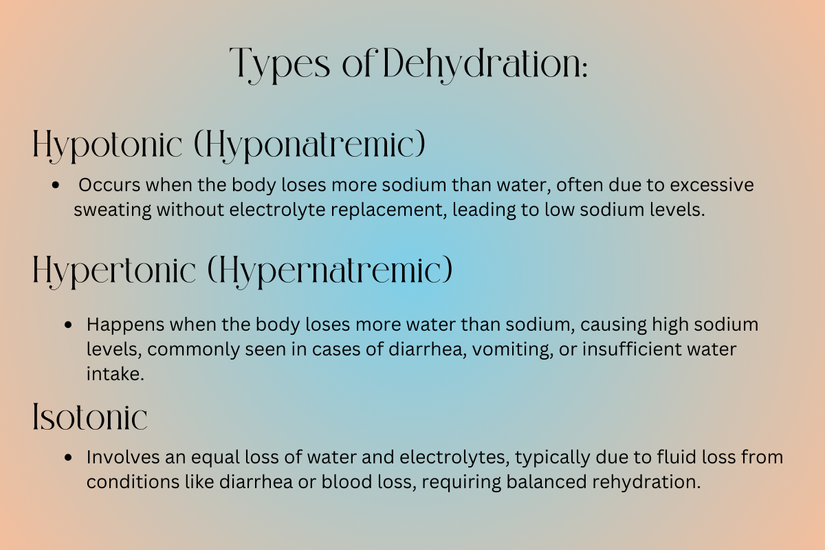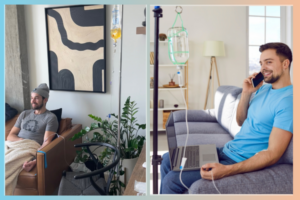
Types of Dehydration: A Guide
October 23, 2024
Types of Dehydration: How Your Body Loses Fluids Introduction
Dehydration is a condition characterized by the loss of more fluids than those taken in by the body, which afterwards affects the performance of important functions of the body. Anyone causes it through sickness, heavy workouts, or lack of enough water intake. Understanding the various types of dehydration serves a key role in selecting the best efficient methods of hydration. Each type of dehydration resulting from either an imbalance in water or electrolytes requires special treatment to help in restoring balance and avoiding complications.
For those seeking a real treatment for dehydration, Uplift IV Wellness has specific IV therapy treatments tailored for more particular hydration needs. Through the understanding of what type of dehydration you are facing, Uplift IV Wellness will be in a position to direct you to which treatment is best for replenishing your fluids and electrolytes with speed so you can continue to take better care of your health and wellness.
What is Dehydration?
When the body loses more fluids and electrolytes than it can absorb, it disrupts the balance of critical body functions like circulation, temperature regulation, and digestion. Furthermore, water and electrolytes like sodium, potassium, and magnesium are highly responsible for maintaining cellular function, loss of which may lead to dehydration.
Common Causes of Dehydration:
- Illness: Diarrhea, vomiting, and fever result in greater fluid loss.
- Heat and Exercise: During physical activity, especially in hot conditions, there is excessive perspiration and loss of fluid.
- Insufficient Intake of Water: Not consuming enough water during the day will easily result in dehydration under conditions of high temperature or physical exertion.
Symptoms and Signs of Dehydration:
- Mouth dryness or thirst
- Lightheadedness or dizziness
- Fatigue and confusion
- Low urination levels or dark-colored urine
- Muscle cramps
It is important to recognize and be treated early because early stages of dehydration ensure that one avoids other complications that might be worse. If it were left untreated, then kidney problems, heatstroke, or even hospitalization may occur. Early symptom recognition and treatment with appropriate rehydration methodologies, like IV therapy, will restore balance and help avoid serious health risks.
Uplift IV Wellness makes it simple to get the hydration you need with quick solutions like customized IV drips that replenish fluids and vital nutrients directly into the bloodstream. This is a quick and effective treatment for any form of dehydration.
3 Types of Dehydration

A breakdown of the three types of dehydration: hypotonic, hypertonic, and isotonic dehydration.
Types of Dehydration: Hypotonic (Hyponatremic) Dehydration
Hypotonic or hyponatremic dehydration occurs when the proportion of sodium lost is greater compared to water. The blood in the body contains less amount of sodium. Sodium helps in major ways to maintain the balance of water in the cells. If there is less amount of sodium, then more amount of water can enter the cells, swelling them up. Causes of Hypotonic Dehydration
This is a very common type of dehydration, as commonly experienced by athletes when their body suddenly starts to sweat profusely during hard physical exercise, and the body fluids are replenished by mere water without the proper restoration of lost electrolytes. Too much intake of pure water without the proper replacement of sodium dilutes the salt concentration of the body fluids, thereby causing an electrolyte imbalance.
Effects on the Body
Low levels of sodium cause nausea, confusion, muscle cramps, and seizures which are severe. Those susceptible to this kind of dehydration are advised to include hydrating drinks containing electrolytes during the period one is experiencing excessive sweating to retain the level of sodium in the body.
Types of Dehydration: Hypertonic (Hypernatremic) Dehydration
Hypertonic dehydration, also termed hypernatremic dehydration, occurs when more water than sodium is lost and the blood sodium rises. Water is pulled out of cells due to the high sodium in the blood; this shrinks the cells, leading to cellular dysfunction.
Causes of Hypertonic Dehydration
Such dehydration is a common thing in patients who have suffered from diarrhea, vomiting, or high temperature, events that result in rapid loss of body water due to very little volume of fluid intake. Infants and elderly are the most prone since they cannot easily tell if they need water.
Body Effects
Symptoms of hypertonic dehydration include extreme thirst, dry skin, and neurologic symptoms related to irritability and restlessness. Such high levels of sodium can cause confusion, muscle twitching, or seizures in severe cases.
Types of Dehydration: Isotonic Dehydration
Isotonic dehydration represents a form of dehydration where there is an equivalent loss of water and electrolytes, hence a total fluid volume that is only reduced but balanced. This type does not have significant shifts in electrolyte concentration as the other forms.
Causes of Isotonic Dehydration
This is the type of dehydration that usually occurs when a person is suffering from some illnesses such as diarrhea, vomiting, and blood loss. Since all of these conditions equally drain out the amount of fluid and electrolytes from the body, this type of dehydration occurs.
Effects on Body
Isotonic dehydration results in fatigue, dizziness, low blood pressure, and tachycardia. It also causes complications such as hypovolemic shock due to the immense reduction of blood volume.
Causes of Dehydration Across Demographics
Dehydration in the Population of Athletes

Electrolyte drinks are essential for athletes to prevent hypotonic dehydration.
Athletes are some of the leading victims of dehydration. The reason is that they undergo heavy and uncontrolled perspiration during exercises or competitions. This will not only be from the high-intensity activity but also from the prevailing environmental conditions, which will be hot and probably humid. This increases their rate of losing fluids from the body. Athletes who only take water as their way of rehydrating the body will lead to hypotonic dehydration.
The athlete should ensure adequate fluid replacement with electrolyte-containing fluids to avoid dehydrating, and the overall fluid intake throughout and following exercise serves to maintain proper fluid-electrolyte balance.
Dehydration in Older Adults
Furthermore, in older adult populations, dehydration has unique challenges. With the rise of age, the sensation of thirst is decreased, making it easier on the person to involuntarily not drink enough fluids. Medications, like diuretics and laxatives, along with kidney diseases and other diseases contribute to the overall possibility of dehydrating.
The elderly should be checked regularly for the sings of dehydration which includes dry skin, confusion and vertigo. Fluids must be given routinely throughout the day.
Pediatric Dehydration
The pediatric patients, especially infants and toddlers may dehydrate more quickly because of their lower total body volume and relatively hypermetabolic state. Because of the rapid fluid loss through vomiting, loose watery stools and fever the most common causes of dehydration among children are infections such as gastrointestinal problems and viral and bacterial infections.
Since this is something for which children often cannot speak, it is up to their caregivers to stay attentive to children’s needs in this regard-especially when a child is feeling unwell or during periods of hot weather.
Dehydration in Everyday Life
It does not necessarily happen to only athletes or people of a particular age group. Many individuals become dehydrated in their day-to-day life due to reasons like not drinking enough water, environmental aspects (heat or humidity), and certain life choices. The most vulnerable people include those who tend to stay outdoors, have jobs that necessitate a hot working environment, or are intakes of high caffeine or alcohol.
In daily life, it is so easy to prevent dehydration just by developing a routine of normal body hydration and by varying the amount of fluid intake depending on the extent of the activity or environment one is currently in.
Symptoms and Severity of Each Type of Dehydration
Mild, Moderate, and Severe Dehydration
Dehydration can be categorized as mild, moderate, or severe. Symptoms, as one might expect, become more dramatic as more fluids and electrolytes are lost by the body. Each type of dehydration-hypotonic, hypertonic, and isotonic-affects the body at each stage of dehydration differently. This is because of the differing balances of water and electrolytes.
Mild Dehydration
As early stages of dehydration start, the body showcases fluid loss with mild symptoms such as:
- Thirst and dry mouth
- Mild headache or dizziness
- Less frequent urination or darker-colored urine
Symptoms at this stage can usually be reversed by replenishing fluids with water or electrolyte-containing fluids. Mild dehydration occurs in ordinary circumstances of prolonged exercise or hot weather.
Moderate Dehydration
If dehydration has progressed to moderate, symptoms start to become evident as such: dry skin and lips, muscle cramps, increased heart rate, lethargy or dizziness, and reduced flow of urine. Following are three kinds of dehydration, each presenting various complications at this level of disease :
- Hypotonic Dehydration: Low level of sodium may bring out confusion or disorientation.
- Hypertonic Dehydration: High sodium level may cause intense thirst and irritability.
- Isotonic Dehydration: Because there is equal loss of fluid and electrolyte, generalized weakness with bounding pulse is seen.
At this stage immediate fluid replacement through the intake of appropriate solution, such as electrolyte solution or IV fluids, is required to avoid further complications.
Severe Dehydration
Severe dehydration is a medical emergency. Its signs and symptoms include:
- Confusion or delirium
- Rapid breathing and pulse
- sunken eyes and dry skin
- Small amount of or no urine output
- Fainting or shock
Electrolyte imbalance of the body becomes critical especially in hypotonic and hypertonic dehydration. Critical cases may resort to IV therapy as the best course of treatment to replenish fluids and electrolytes at a faster rate.
Common Complications of Untreated Dehydration
Kidney Damage
Prolonged stress on the kidneys can result in kidney stones, urinary tract infections, and even the failure of the kidneys due to chronic dehydration. Fluid intake is necessary for the kidneys to filter and regulate electrolytes.
Heatstroke
In hypertonic dehydration, it is possible that one’s body can’t regulate the body temperature as easily, especially in cases of very hot temperatures endured for a long period of time. If one fails to replenish fluids, then heatstroke may occur resulting in dizziness, fainting, and deadly organ damage.
Cognitive Decline
Brain dysfunction results in problems of cognition, both short and long term. Confusion, memory loss, and an inability to concentrate are common symptoms, especially in hypotonic dehydration when sodium levels drop catastrophically low.
The Risks of Improper Treatment
Wrong hydration worsens the symptoms of dehydration. For example, in hypotonic dehydration, the use of water alone for the individual may prolong the dilution of sodium, aggravating the condition into hyponatremia. In the same way, in hypertonic dehydration, lack of concern about the replenishment of electrolytes could result in high, very dangerous levels of sodium, promoting severe complications. In the light of the scenario above, identification of the type of dehydration will help the physician to choose an appropriate method of hydration-oral fluids or IV therapy-for effective treatment.
Hydration Strategies for Each Type of Dehydration
Accurate identification of the types of dehydration and selection of appropriate hydration strategies become crucial in the management of body fluid and electrolytes to avoid dehydration. Each of these types of dehydrations, either hypotonic, hypertonic, or isotonic, will need various methods of proper rehydration and balance.
Hypotonic Dehydration: The Need for Electrolyte Drinks Over Water
In hypotonic dehydration, the human body loses more sodium than water. Exercising with just water will further dilute the sodium and aggravate the condition. The key to prevention and treatment, however, is to shift the emphasis from plain water to electrolyte-rich drinks. These drinks normalize levels of vital minerals, such as sodium and potassium, and prevent severe health complications, including hyponatremia. Athletes or those who experience excessive perspiration, on the other hand must add more sports drinks, or other forms of pre-treated electrolyte solutions, in order to be correctly balanced to his hydration regime.
Hypertonic Dehydration: Gradual Water Intake and Avoidance of Excessive Sodium
A person acquires a hypertonic dehydration when he loses more water compared to sodium, which in effect, concentrates the sodium within the blood. Hypertonic dehydration can be avoided by gradually increasing water intake along with the avoidance of excessive sodium content within the diet. The rehydration process, however, is best done in small quantities so that your body can adjust to the amount of water intake and not overload the system. Diarrhea, vomiting, and very high fever are cases that may lead to hypertonic dehydration, and regular sips of water throughout the day can be quite crucial in maintaining hydration.
Isotonic Dehydration: Balanced Rehydration with Water and Electrolytes
Isotonic dehydration refers to dehydration that presents with equal water and electrolyte losses. Patients can prevent this type of dehydration by maintaining equal volumes of water and electrolyte consumption, particularly while ill or exercising. A combination of water and electrolyte drinks replaces the body’s fluids and supplies it with an adequate amount of electrolytes.
Role of IV Therapy in Treating Dehydration

IV therapy offers fast, effective rehydration, especially for acute dehydration.
IV treatments provide rapid and effective forms of treatment for any level of dehydration by introducing fluids, electrolytes, and nutrients directly into the blood. Administered this way, treatment bypasses the digestive systems, thus providing faster absorption and more rapid rehydration.
Hydration treatments are available at Uplift IV Wellness, as determined by specific dehydration needs. Whether your body is suffering from hypotonic, hypertonic, or isotonic dehydration, IV therapy will replace the appropriate amount of fluids and electrolytes in the body. If you are one of those people who need quick rehydration after being sick, working out a lot, or being out too much in extremely hot weather, Uplift IV Wellness offers mobile IV therapy in NJ for your convenience.
IV Therapy for Dehydration at Uplift IV Wellness
At Uplift IV Wellness, a range of IV treatments has been devised to act against different kinds of dehydration for the perfect care of each individual’s different hydration needs.
Uplifted Meyers’ Cocktail: Best for Isotonic Dehydration
The Uplifted Meyer’s Cocktail is best because of isotonic dehydration, where fluids and electrolytes are lost on an equated basis. This IV drip contains a very unique blend of Vitamin C, B-Complex, and magnesium, which makes this solution ideally positioned to replace low energy levels, enhance the immune function, and rehydrate the body after a loss of fluid.
The Hangover Lifted treatment will provide for both fluid and electrolyte replenishment for those suffering from hypotonic dehydration due to excessive perspiration or over-consumption of alcohol. The blend of electrolytes, vitamins, and hydration within this IV drip work in concert to rapidly return sodium balance and alleviate symptoms related to dehydration due to a fluid/electrolyte imbalance.
Mobile IV Therapy: A Solution Fast and Effective
For those in whom oral rehydration is either problematic or too slow, Uplift IV Wellness offers mobile IV therapy to bring hydration right to the comfort of one’s own home or office. This is very helpful for people who are experiencing acute dehydration or any other condition that prohibits them from drinking fluids. Mobile IV treatments are a quick, easy way to rehydrate and hence a very effective treatment for all forms of dehydration.
Getting Medical Help for Dehydration
Moderate levels of dehydration may be able to be restored by replenishing fluids at home; however, severe dehydration must be treated in the hospital. Because being aware of warning signs of severe dehydration is what will help one avoid damage to their long-term health, there are different symptoms for each kind of dehydration that indicate it is time to seek professional medical attention.
Warning Signs that You May Want to Seek a Professional for Medical Treatment
- Excessive thirst and dry mouth-when thirst becomes unbearable, along with the dryness of mouth and lips that are cracked-point to a case of severe dehydration.
- Dizziness or Confusion: Severe signs that include confusion, dizziness, and even fainting, wherein the body is ineptly battling to maintain its fluid balance, especially in cases of hypotonic or hypertonic dehydration.
- Low Volume of Urine or None at All: Dark-colored urine or no urination at all is a sure sign that dehydration is affecting the kidneys and the normal mechanisms of balancing fluid. This is a result of not having enough fluids to provide volume for the blood vessels.
- Increased Heart Rate and Respiratory Rate: These symptoms might indicate that the body is compensating in an attempt to maintain circulation on account of the reduction of fluid levels. This may be because, in cases of isotonic dehydration, blood volume has reduced.
- Sunken eyes or dry, wrinkled skin are other forms these symptoms can take. These are typical signs that the body is experiencing a large amount of water loss.
All of these symptoms should be considered a call for immediate medical attention. Severe dehydration is susceptible to serious complications and thus warrants timely intervention as part of effective management to forestall further decline in health status.
I.V. Therapy for Acute Dehydration
Where oral hydration is impossible or ineffective, especially in acute cases, IV therapy quickly salvages the situation by restoring fluid and electrolyte balance. It is necessary for the most severe forms of hypotonic, hypertonic, and isotonic dehydration, usually leaving the body with greatly out-of-balance electrolytes or rapid fluid loss. IV provides hydration through direct delivery into the blood; hence, it yields faster rehydration and relief than by drinking fluids. Uplift IV Wellness offers customized IV hydration treatments to quickly fix severe dehydration and make sure that the body balances itself.
Conclusion
Knowledge of the types of dehydration would, therefore, enable one to make the appropriate choice of treatment and avoid immense risks to health. Whether mild or acute, the most rapid and surefire way of rebalancing things would be through IV therapy. If you want to get a personalized hydration treatment, then you should reach out to Uplift IV Wellness today and schedule your IV treatment to keep yourself healthy and hydrated.